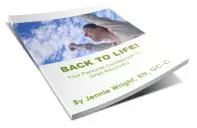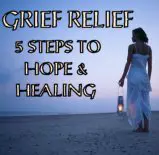New grief stages…
We presented in our “Stages of Grief” section three other often cited working models of the grief process. In the interest of completeness, we summarized them in the other 3 sections, and feel it may help you to read them all.
However, in my studies of the research done on grief, I have found that this 3-step model, “The New Grief Stages”, is more flexible, broad, understandable and accurate in describing the tasks to be completed during the grieving process.
Once again, keep in mind that there is no timetable for grief. No right or wrong way. Grief is as individual as you, your relationship with your lost one, and the circumstances of the death are. This is such an unpleasant, lengthy process that you may wonder how long it all will last, and when you can expect some relief from the pain.
Some people find that within a few months, the distress lessens, and they are able to find some peace and closure, and renewed hope and enjoyment in life.
Others may face years of relentless waves of grief, get stuck in chronic mourning and require professional help to find resolution.
Most people fit somewhere between these two extremes, and come to a satisfactory resolution of their grief after a year or up to two years of mourning.
The New Grief Stages
These are the three phases of the New Grief Stages:
- SHOCK- New grief stages…Upon receiving the bad news of the death of a dearly loved one, most people react with an initial period of shock, or numbed disbelief. This is actually your psyche protecting your mind from being overwhelmed all at once by the tragedy.
Many report being unable to function or perform even simple tasks or make decisions. You may have a sense of unreality, or feel like you are “sleepwalking”.
This is a time for the gathering of family and friends to offer you support. Accept it, and let them help you through the mourning rituals and funeral decisions that must be made.
You’ll have physical symptoms such as agitation, weakness, crying and aimless activity. Shock may last for hours, even up to weeks. But then reality slowly sets in…
- SUFFERING- New grief stages…As the shock wears off, the pain begins. This is a time of emotional upheaval, and you will experience overwhelming and excruciating pain. Pain so palpable as to feel physical as well as emotional. Physical symptoms may include loss of appetite and weight, chest pain, insomnia and extreme fatigue. Emotional symptoms of sadness, anger, guilt, anxiety, restlessness, and agitation may occur. The hallmarks of this phase are rapid mood swings, intense emotions and loss of control over your psyche. You may even feel like you are losing your sanity.
This is the stage at which you need the most emotional support from friends and family. Unfortunately, by this time, they have probably gone back home to the business of living their lives. Or they may pressure you to “get over it” and “get on with your life”. And so you are left to cope alone. Seek out someone to help support you, and/or find a support group to lend an ear. It is important that you not grieve alone.
Later in this second stage, you will come to a more orderly existence, but you will feel lonely and depressed, alternating with waves of intense grief. The “roller coaster ride” of grief. As long as your emotions are moving and changing, unpredictable, and “fluid”, your grief is right on track. Surrender to it, and let the grief take you where you need to go. Your grief is wiser than you.
This active grieving stage, suffering, lasts for months, and even intermittently for years. It is a normal and necessary part of grieving, and it is important not to avoid it, delay it, ignore it or suppress it. To the contrary, it is important that you experience it fully and express it openly in your own way.
- RECOVERY- New grief stages…Many, but not all, who grieve start to see some improvement in their emotions after a year has passed. Acceptance and full recovery don’t happen overnight. Your depression and despair will just slowly start to turn a corner and lighten up for you.
This stage is not the end of pain, but the ability to function with it and reconnect to the interesting and happy parts of life. Your great hurt will never be forgotten… it just recedes into the background of your life. Other more immediate demands will start to take precedence. Your son’s soccer game will take on some importance for you once again.
And you may see ONE benefit from your grief experience… a new appreciation for the preciousness of life and a new-found ability to live life in the moment.

HELPFUL RESOURCES

~Are you devastated by the loss of a loved one?
~Bewildered by all the strong emotions and crazy symptoms?
~Wondering how you are ever going to survive?
~Tired of being stuck in a complicated grief?
Back To Life! Our Personal Grief Guidebook might be just the help you are looking for. Read more about this most useful and practical recovery guide here:
Back To Life!
In addition to the written guidebook, we also offer a unique audio program to help with grief coping and relaxation. If you think an audio approach might be helpful, consider this program:
Return From New Grief Stages to “Grief Stages”


